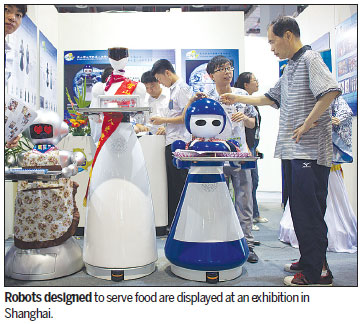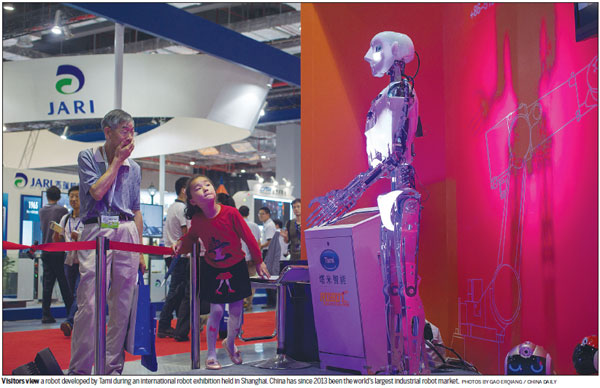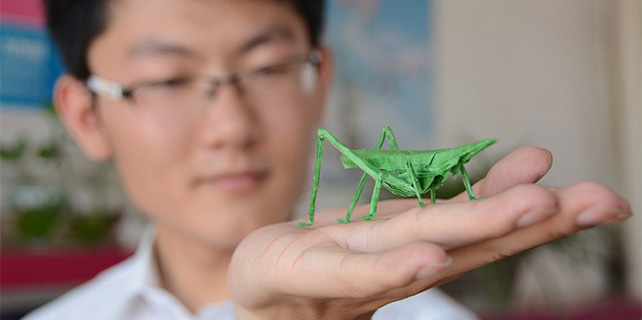A mind of its own
As the adoption of artificial intelligence gains pace around the world, the question of whether this exciting new technology is a friend or foe to humans is one that is divided in opinion
Robots have been steadily taking over the jobs of humans in manufacturing sectors and some have even proved to be more capable in handling highly complex tasks.
As such, many companies around the world have in recent years embraced artificial intelligence (AI) as a means of boosting productivity and efficiency. In its bid to become a global science and technology hub, Shanghai too has trained its sights on AI.
"Intelligence has been identified as a key characteristic for the next generation of robots and the Chinese government is actively promoting a technological revolution in this regard through a variety of exchanges," said Jin Li, vice-president of Fudan University, during a recent intelligent robotics forum between China and the United Kingdom in Shanghai.
While China may be a latecomer in robotics development and technology, it is today the world's largest robot market that accounted for half of the sales of new robots globally between 2014 and 2016, said Fu Guoqing, chief engineer of the Shanghai Science and Technology Commission.
Earlier this year, China's Ministry of Science and Technology established a 2 billion yuan ($294 million) special fund for intelligent robot research and development, according to China Securities Journal.
Zhu Sendi, a consultant with the China Machinery Industry Federation, pointed out that intelligent manufacturing and robots are key factors in realizing the "Made in China 2025" plan. He added that many institutions and organizations have made different projections about the size of the AI market, expecting it to range from $18.3 billion to upwards $180 billion by 2020.

Over at Fudan University's Institute of Science and Technology for Brain-Inspired Intelligence, a project called Shanghai Brain aims to combine brain research techniques such as high precision brain imaging, multi-channel in-body recording and in vivo neuronal activity with brain-inspired computing to enhance early diagnosis and treatments for brain diseases.
"We are trying to develop the artificial general intelligence (AGI), a robot with a brain that is capable of reinforcement and deep learning," said Feng Jianfeng, the dean of the institute.
Despite the lack of a clear timeline, the Shanghai Brain project has already received 200 million yuan in investments.
Colin Angle, chairman, CEO and co-founder of iRobot, envisions that future homes will essentially be large robots that people live in. A manufacturer of home cleaning robotics, iRobot has sold more than 15 million units around the world since it was founded in 1990.
"A true smart home will one day have hundreds of connected devices in it. Every light bulb, thermostat, television, radio and heating system will be connected. When you are at home, the lights and heating will automatically be switched on. If you typically watch television in a room at a particular time of the day, the device will also switch itself on. The house of the future will be able to better serve the needs of the resident. We would no longer have to manage hundreds of technology products ourselves," he said.
"The Chinese government is doing a very smart thing by making robotics a priority for the country. The goal of the plan is to increase technology in manufacturing to allow factories to work smarter and more efficiently. So, even as wages increase, manufacturing jobs in China can still be preserved," he added.
AI has proven in recent times that it is capable of doing more than just processing complex problems at greater speeds.
In the United States, The Associated Press has been using AI to generate sports articles. In January, a robot called Xiao Nan at Guangzhou-based Southern Metropolis Daily took just one second to write a short article on the Spring Festival travel rush.
Other robots have even demonstrated an ability to be creative in literature. In May, Microsoft announced that its AI chatbot Xiaoice, which means "little ice" in Chinese, published a book of poems. Over in Japan, a robot co-wrote a short novel titled The Day A Computer Writes A Novel. While much of the work was done by humans, the project nevertheless shed light on AI's potential.
"AI programs have often been used to solve problems that have answers, such as Go and shogi. In the future, I'd like to expand AI's potential (so it resembles) human creativity," Hitoshi Matsubara, the leader of the team that created the robot, told the Yomiuri Shimbun.
One of the most high-profile achievements by AI recently was accomplished by AlphaGo, a Go-playing program created by DeepMind, when it defeated the world's top-ranked player Ke Jie in three consecutive games in May. Jack Ma, founder and chairman of Alibaba Group, commented that the result was a tragedy for mankind.
He also noted that the world's most effective CEO in the future could be a robot as machines do not get affected by emotions like humans do.
"Machines can do what people can't. We must make machines our best partner, rather than letting them replace us," he said.
Some of the world's most prominent people have similarly warned about the ramifications of AI.
Elon Musk, the CEO of SpaceX and Tesla, once said that dabbling in AI is akin to "summoning the demon" while legendary theoretical physicist Stephen Hawking said that AI "could spell the end of the human race".
Zhu offered a different perspective to the matter, suggesting that the fear of robots spelling doom for mankind is irrational.
"AI is the current trend and the future. The reality of AI permeating different aspects of our lives is similar to the evolution of the internet. It is possible that we will one day find it difficult to imagine a life without AI, just like how we cannot live or work without an internet connection today," he said.
wang_ying@chinadaily.com.cn

(China Daily USA 07/14/2017 page9)












